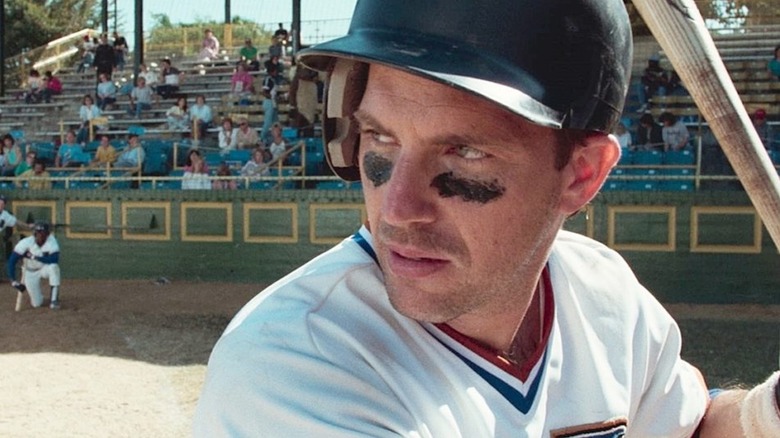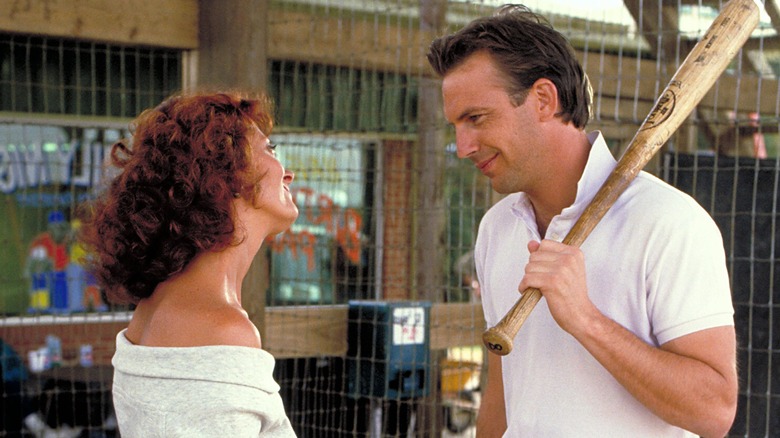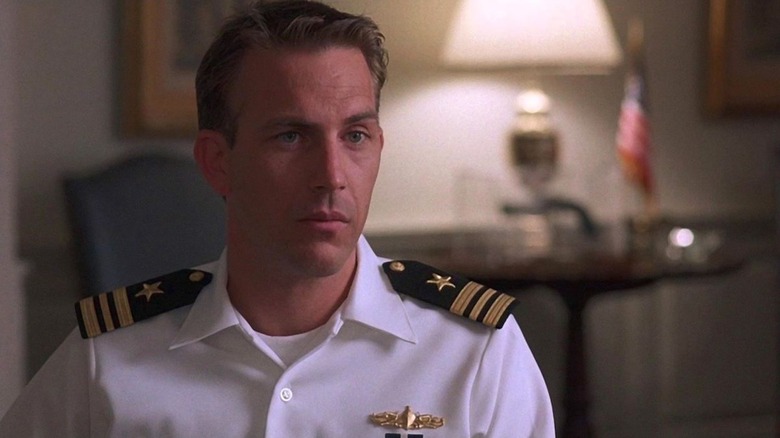One Of Kevin Costner's Best Sports Movies Was Rejected By Nearly Every Studio
We may receive a commission on purchases made from links.
Ron Shelton's "Bull Durham" is a shaggy wonder. It's a sports film that is wholly disinterested in winning or losing — at least when it comes to the playing field. There is competition in the film, but it's for a place in the bed of Susan Sarandon's baseball groupie/guru Annie Savoy, and even this competition is over pretty quickly. Kevin Costner's journeyman Crash Davis, a nearly washed-up catcher who once spent 21 glorious days in the majors (aka "the show"), cedes Annie to Ebby Calvin "Nuke" LaLoosh, a fireball-hurling phenom with a "ten-cent brain," because he's appalled by her romantic interest in an imbecile. But Crash and Annie form a partnership of sorts via their shared education of Ebby Calvin. The sole reason Crash has been brought to the minor league Durham Bulls is to mold this knucklehead into a big-league stud. Meanwhile, Annie attempts to culture him (though she's got plenty of spot-on pitching pointers as well).
Amazingly, everyone gets what they want in "Bull Durham," though, for Crash and Annie, it's not in the way they expect. It's such a beautiful, soulful movie, one that would never stand a chance of getting made at a Hollywood studio in 2025. I'm not sure a streamer would even take a crack at it as a feature nowadays; they'd probably want to turn it into a series à la "Ted Lasso."
"Bull Durham" wasn't exactly a no-brainer green light in the late 1980s. The film, which has the unhurried, ramshackle aesthetic of a 1970s movie, confounded all of the major studios when Shelton shopped the project almost 40 years ago. It actually came one day away from never getting made. Ultimately, the fate of this classic was decided by one rave review in The New York Times.
There's no crying in pitching a baseball movie
In "The Church of Baseball," Shelton's must-read memoir about the making of "Bull Durham," he recounts in cringe-inducing detail how he wrote a screenplay just about everyone in Hollywood loved and no one wanted to make. The project had an early backer in producer Thom Mount, the one-time Universal wunderkind exec who'd left the studio to ink a production deal at Columbia Pictures, but he couldn't get his new studio's top dog at the time, the stuffy Englishman David Puttnam (who two of the biggest movie stars of the 20th century have told me is a petty twit), to greenlight it.
Shelton, being a gentleman, only had kind words in his memoir for the man who steadfastly refused to make what wound up being an all-time classic. Perhaps because he's speaking from the mountaintop of a masterpiece, he's shockingly zen about the fact that he was forced to pitch the film over and over again at nearly every studio in town. And this was with Kevin Costner attached to star as Crash Davis.
Costner was at an interesting place in his legendary career in 1987. He'd given a breakout performance in Lawrence Kasdan's throwback Western "Silverado," and solidified his movie star bona fides as crime fighter Eliot Ness in Brian De Palma's box office smash "The Untouchables." The studios were aware of Costner's potential, but they weren't sold on "Bull Durham" because it was a baseball movie (which was considered a risky bet at the time) without a conventional narrative trajectory. As the rejection tour dragged on into a second round of failed pitches, Costner became attached to a big-deal prestige project called "Everybody's All-American." With proven A-list director Taylor Hackford ("An Officer and a Gentleman") behind the camera, this was a go picture.
Costner's management wanted their client on "Everybody's All-American," but the rising star was personally invested in "Bull Durham," so they gave Shelton a small window to close a deal before yanking their boy. The unproven filmmaker's salvation would be Costner's second hit of the summer of 1987.
Vincent Canby came to the rescue
On paper, Roger Donaldson's "No Way Out" looked like a lazy, late-summer programmer. The Beltway thriller boasted a top-notch cast in Costner, Gene Hackman, and Sean Young, but, aside from Costner being red-hot coming off "The Untouchables," it emanated been-there-done-that vibes.
Fortunately for Shelton, "No Way Out" was a crackerjack suspense flick with an expertly calibrated screenplay by Robert Garland. If you've never seen it, place it at the top of your viewing queue and thank me at your leisure. It's a great film. The New York Times' chief film critic, Vincent Canby, agreed, and his Friday morning write-up is the sole reason "Bull Durham" exists.
Orion Pictures made "No Way Out," and they were the last studio that was kinda-sorta interested in making "Bull Durham." Shelton was less than 24 hours away from losing Costner to "Everybody's All-American" when the company's honchos read Canby's rave review. They were fairly certain they had a hit, and, even if the movie didn't catch fire, they knew they had to be in the Kevin Costner business. As Shelton wrote in his memoir:
"Any other kind of review and 'Bull Durham' might never have been made. Still, I've never heard of a script being submitted to a studio on a Thursday night and having a deal virtually closed by the next day. Especially a project that everyone had passed on ... twice."
Orion wanted "Bull Durham" for the summer of 1988, so once he had his green light, Shelton had to rush into production. He managed just fine. "Bull Durham" is one of those movies that feels fated to be. Every moment sings, the highlight being Costner's inebriated delivery of the "dying quail" monologue. Orion's faith in Costner wouldn't save the company from bankruptcy, but it did net them a load of Oscars when they backed the first-time director's "Dances with Wolves." You can't make great movies if you don't swing for the fences.


